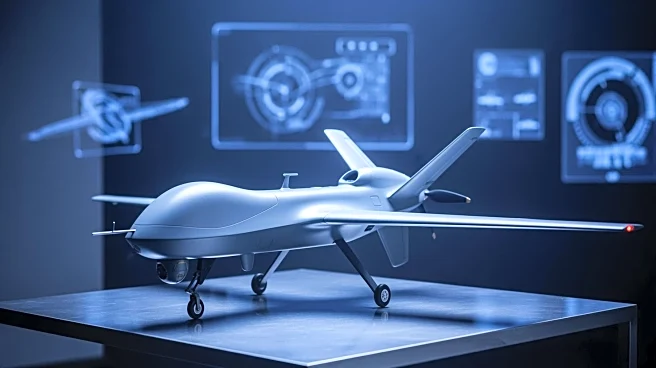What's Happening?
Saudi Arabia is in negotiations with General Atomics for a potentially historic military drone deal involving up to 130 MQ-9B drones and 200 collaborative combat aircraft. The discussions are part of a broader defense agreement between Saudi Arabia and the
United States, which includes the sale of F-35 jets and advanced missile defense systems. This deal follows a $142 billion defense sales agreement signed in May, marking a significant expansion of U.S.-Gulf defense ties. The MQ-9B drones, known for their advanced capabilities, are designed to operate safely in civilian airspace and can be equipped with various weapons and sensors. Saudi Crown Prince Mohammed bin Salman recently visited Washington, D.C., securing these multibillion-dollar deals with President Trump, who has emphasized the strategic importance of Saudi Arabia as a non-NATO ally.
Why It's Important?
The potential drone deal highlights the strengthening defense relationship between the U.S. and Saudi Arabia, which is crucial for both countries' strategic interests in the Middle East. The inclusion of advanced drones and combat aircraft in Saudi Arabia's arsenal could significantly enhance its military capabilities, particularly in air combat and surveillance. This development also underscores the U.S.'s commitment to supporting Saudi Arabia's defense modernization efforts, despite concerns over human rights issues. The deal could shift the balance of power in the region, affecting U.S. relations with other Middle Eastern countries, including Israel, which has expressed concerns over maintaining its qualitative military edge.
What's Next?
If finalized, the drone deal could lead to local manufacturing opportunities in Saudi Arabia, further boosting its defense industry. The agreement may also prompt reactions from other regional players, potentially influencing their defense procurement strategies. The U.S. and Saudi Arabia are likely to continue expanding their defense cooperation, with future deals possibly involving more advanced technologies and systems. The ongoing negotiations and their outcomes will be closely watched by international stakeholders, including defense contractors and geopolitical analysts.
















